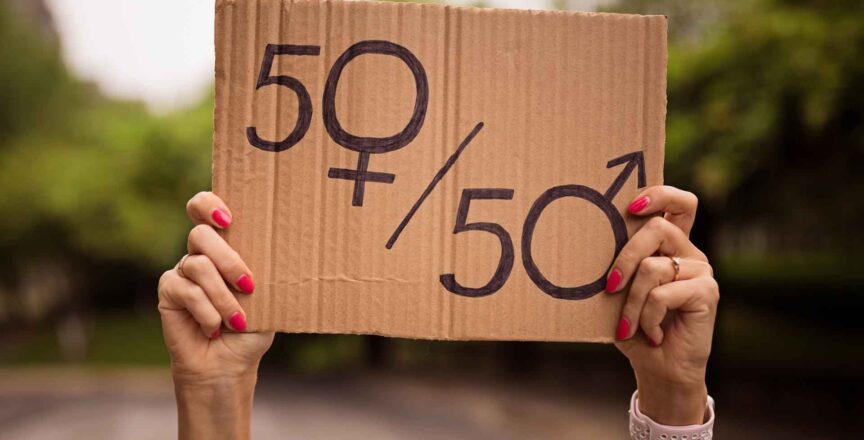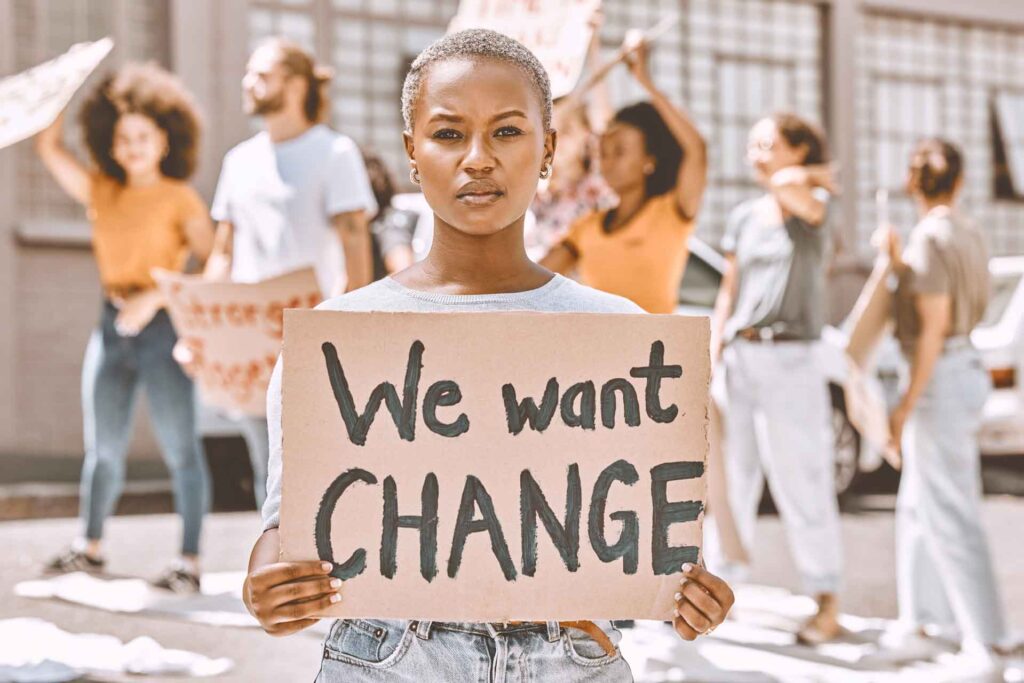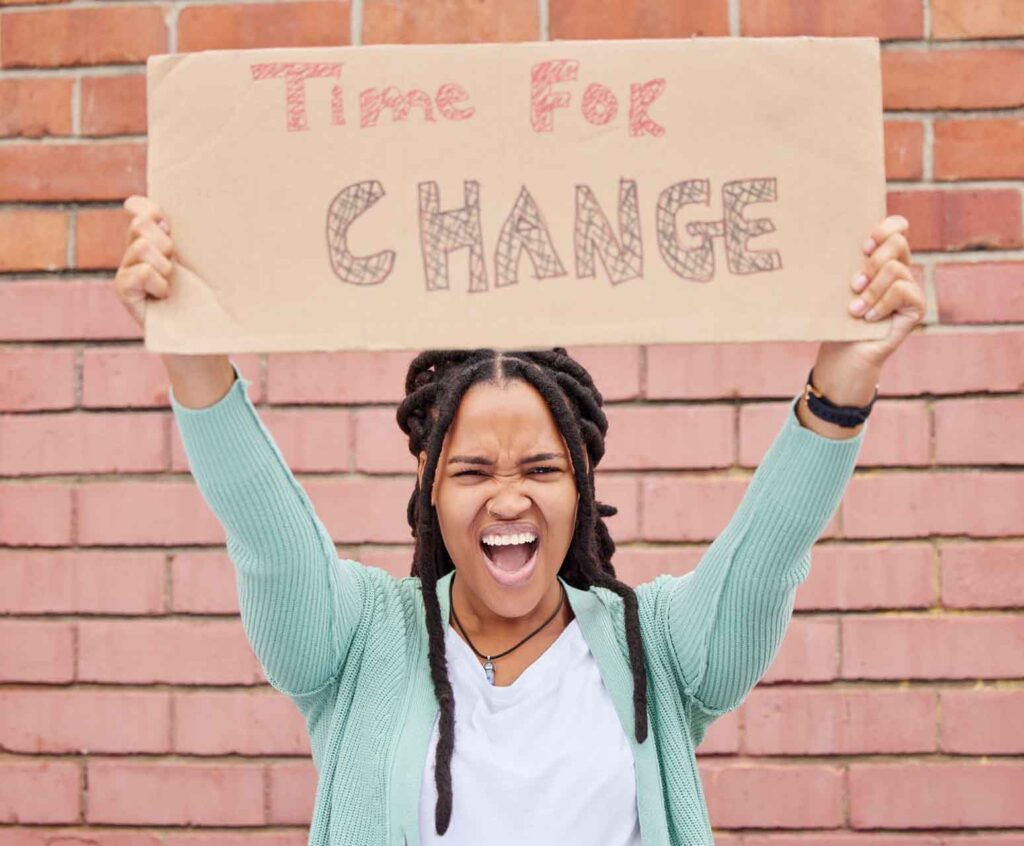
Are you a black woman who faces racism and sexism at work? Or are you an ally who wants to help? Either way, you’re in the right place.
In this article, we’ll explore the challenges and solutions for gender discrimination against black women in the corporate world.

1. Understanding the Intersection of Racism and Sexism
Let’s kick things off by diving into the deep end of the pool – the concept of intersectionality.
This term, coined by Kimberlé Crenshaw, is a fancy way of saying that different forms of discrimination can intersect and amplify each other. For black women at work, this often means dealing with a double whammy – racism and sexism.
Imagine trying to climb a corporate ladder that’s greased with bias and prejudice. It’s not just an uphill battle; it’s like trying to scale Mount Everest in flip-flops!
The Reality of Intersectionality
According to a study by the National Bureau of Economic Research, black women are often the most disadvantaged group in the workplace, facing both racial and gender bias.
They’re less likely to be promoted, more likely to be paid less, and often find themselves pigeonholed into lower-level positions.
But don’t let these statistics get you down. Remember, black women are not just survivors; they’re conquerors! They’ve been breaking barriers and shattering glass ceilings long before it was a trending hashtag.
So, whether you’re a black woman navigating these challenges or an ally looking to support, understanding intersectionality is the first step towards creating a more inclusive workplace.
And remember, change begins with awareness. So let’s keep this conversation going!
2. The Challenges Faced by Black Women in Corporate America
Let’s get real. Being a black woman in the corporate world is no walk in the park. It’s more like a marathon… on a tightrope… over a pit of alligators. But hey, who doesn’t love a challenge?
The Only One in the Room
Ever felt like you’re the only one dancing at a party? Now imagine that feeling at work, every single day. Many black women often find themselves being the only black person in the room. It can feel isolating, and at times, daunting.
The Pay Gap
Let’s talk numbers. According to a report by the National Women’s Law Center, black women typically make only 63 cents for every dollar paid to their white, non-Hispanic male counterparts. That’s not just unfair; it’s downright outrageous!
The Glass Ceiling
The corporate ladder for black women often feels more like a glass ceiling. They’re less likely to be promoted and more likely to be pigeonholed into lower-level positions. But remember, glass can shatter!
The Microaggressions
Then there are the microaggressions – those subtle, often unintentional, acts of racism or sexism. They’re like mosquitoes at a barbecue – small, annoying, and they can ruin your day.
Despite these challenges, black women continue to rise, proving time and again that they are not just survivors, but conquerors. So whether you’re navigating these challenges or looking to support someone who is, remember – change begins with awareness.
3. The Stereotype of the “Angry Black Woman”
Let’s talk about a stereotype that’s as persistent as a pop song chorus that you can’t get out of your head – the “angry black woman”.
This stereotype paints black women as overly aggressive or irrationally angry. It’s like being typecast in a movie you didn’t even audition for!
The Origins of the Stereotype
This stereotype didn’t just appear out of thin air. It has deep historical roots and has been perpetuated by media portrayals. It’s like a bad game of telephone that’s been going on for centuries.
The Impact at Work
At work, this stereotype can affect how black women are perceived and treated. It can influence everything from performance evaluations to promotion opportunities. It’s like having an invisible hurdle on the track to success.
Breaking Free from the Stereotype
Breaking free from this stereotype involves challenging it head-on. It means creating spaces where black women can express their emotions without fear of being labeled as “angry”. It’s about changing the narrative, one conversation at a time.
Remember, stereotypes are like bad hair days – we all have them, but they don’t define us.
So whether you’re a black woman navigating these stereotypes or an ally looking to support, let’s continue to challenge and change these narratives.
4. Code-Switching and Dimming One’s Light
Ever felt like you’re wearing a mask at work? No, not the pandemic kind.
We’re talking about the metaphorical mask that many black women find themselves wearing in professional settings. This is often referred to as code-switching or dimming one’s light.
The Art of Code-Switching
Code-switching involves altering one’s behavior, appearance, or speech to fit into different cultural contexts. It’s like being a chameleon, constantly changing colors to blend in with the environment.
The Cost of Dimming One’s Light
Dimming one’s light refers to downplaying one’s personality, achievements, or identity to avoid standing out or causing discomfort to others.
It’s like turning down your inner brightness to avoid outshining others.
The Impact on Black Women at Work
For black women at work, code-switching and dimming one’s light can be exhausting and demoralizing. It’s like running a marathon with weights on your ankles.
Shining Bright in the Face of Adversity
Despite these challenges, many black women continue to shine bright in the workplace, breaking barriers and making their mark. They’re like diamonds – formed under pressure but unbreakable and valuable.
So whether you’re navigating these challenges or looking to support someone who is, remember – everyone should have the right to shine their light brightly at work.
5. The Resilience and Achievements of Black Women
Let’s switch gears and talk about the resilience and achievements of black women.
Despite the challenges, black women have been breaking barriers and shattering glass ceilings in various fields. They’re like superheroes without capes!

The Power of Resilience
Resilience is like a superpower that allows black women to navigate through challenges and come out stronger on the other side. It’s like having a built-in GPS that reroutes you whenever you hit a roadblock.
Celebrating Achievements
From business owners to social change makers, black women have been making their mark in every field imaginable. They’re not just participating in the race; they’re setting the pace!
Inspiring Stories
Let’s take a moment to celebrate some of these inspiring stories. From the boardroom to the courtroom, from science labs to art studios, black women are leading the way and inspiring future generations.
The Role of Education
Education plays a crucial role in these achievements. Highly educated black women are challenging stereotypes and changing narratives every day. They’re like living proof that knowledge is power!
So whether you’re a black woman striving for success or an ally looking to support, remember – every achievement, no matter how small, is a step towards change.
6. How Allies Can Support Black Women at Work
Now, let’s talk about allies. You know, those wonderful folks who use their privilege to support others. Being an ally is like being a superhero sidekick – you may not have superpowers, but you play a crucial role in the fight for justice!
Recognizing the Signs of Discrimination
The first step to being an effective ally is recognizing the signs of discrimination. It’s like developing a sixth sense for injustice. Once you know what to look for, you can take action.
Advocating Effectively
Advocacy is a powerful tool in the fight against discrimination. It’s like having a megaphone that amplifies the voices of those who are often unheard.
Whether it’s speaking up in meetings or supporting policies that promote equality, every action counts.
Creating a More Inclusive Workplace
Creating a more inclusive workplace is a team effort. It’s like building a puzzle – every piece plays a crucial role. From implementing inclusive policies to promoting diversity in leadership roles, there’s a lot that allies can do.
The Role of HR Professionals
HR professionals play a key role in addressing discrimination and creating an inclusive workplace. They’re like the referees in the game of corporate politics – ensuring fair play and penalizing foul behavior.
So whether you’re an ally looking to support or a black woman navigating these challenges, remember – together, we can create a workplace where everyone feels valued and respected.
7. Creating a More Inclusive Workplace
Alright, let’s roll up our sleeves and get down to business. How can we create a more inclusive workplace? It’s like baking a cake – it requires the right ingredients, a good recipe, and a bit of patience.
Implementing Inclusive Policies
Inclusive policies are the backbone of an inclusive workplace.
They’re like the rules of the game – ensuring fair play for everyone. From equal pay policies to flexible work arrangements, there’s a lot that organizations can do.
Promoting Diversity in Leadership Roles
Diversity in leadership roles is crucial. It’s like having a variety of flavors in your ice cream sundae – it makes it more enjoyable and interesting. Plus, diverse leadership can lead to more innovative and effective decision-making.
Addressing Discrimination Proactively
Addressing discrimination isn’t just about reacting to incidents. It’s about being proactive and preventing them from happening in the first place.
It’s like putting on sunscreen before you go out in the sun – it’s always better to prevent than to cure!
The Role of HR Professionals
HR professionals are the gatekeepers of an inclusive workplace. They’re like the gardeners of the corporate world – planting the seeds of inclusivity, watering them with fair policies, and pruning any weeds of discrimination.
So whether you’re an HR professional looking to create change, an ally supporting your colleagues, or a black woman navigating these challenges, remember – creating an inclusive workplace is a team effort. And together, we can bake the cake of inclusivity!
Conclusion: The Journey Towards Equality
As we wrap up this exploration of gender discrimination in the context of black women at work, let’s take a moment to reflect on the journey so far.
It’s been a rollercoaster ride, with ups and downs, twists and turns. But through it all, one thing remains clear – the resilience and strength of black women.
The Power of Awareness
Awareness is the first step towards change. It’s like turning on a light in a dark room – suddenly, you can see everything clearly. By understanding the challenges faced by black women at work, we can begin to address them.
The Role of Allies
Allies play a crucial role in this journey. They’re like the wind beneath the wings of change – providing support and momentum. Whether it’s recognizing the signs of discrimination or advocating for inclusive policies, every action counts.
The Future is Bright
Despite the challenges, the future is bright. With each barrier broken and each glass ceiling shattered, we move one step closer to equality. It’s like climbing a mountain – the journey may be tough, but the view from the top is worth it!
So whether you’re a black woman navigating these challenges, an ally looking to support, or an HR professional striving to create an inclusive workplace, remember – together, we can create a world where everyone is valued and respected.
Here’s to a future where gender discrimination is a thing of the past!
FAQ
Q: What is gender discrimination? A: Gender discrimination involves treating someone unfavorably because of their gender. It can occur in various settings, including the workplace.
Q: How does gender discrimination affect black women at work? A: Black women often face intersectional discrimination, dealing with both racism and sexism. This can lead to challenges such as pay gaps, limited opportunities, and stereotypes.
Q: What is intersectionality? A: Intersectionality is a concept that describes how different forms of discrimination can intersect and amplify each other. For black women, this often means dealing with both racism and sexism.
Q: What is code-switching? A: Code-switching involves altering one’s behavior, appearance, or speech to fit into different cultural contexts. Many black women find themselves code-switching at work to blend in or avoid conflict.
Q: How can allies support black women at work? A: Allies can support by recognizing signs of discrimination, advocating for inclusive policies, and promoting diversity in leadership roles.
Last modified: October 16, 2023



